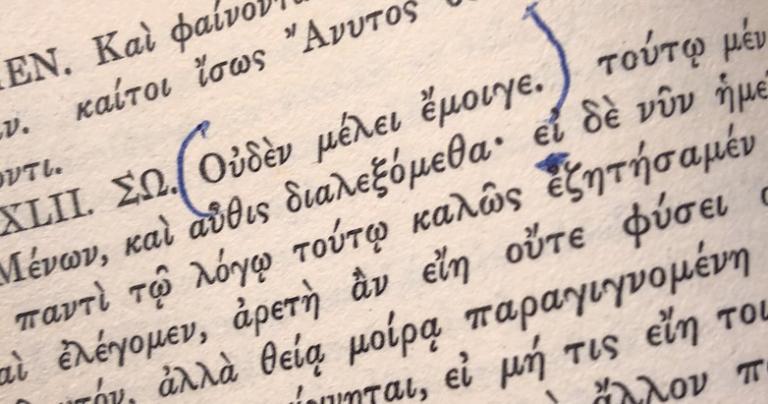 “Is it better to be a happy cat or a discontented Socrates?”
“Is it better to be a happy cat or a discontented Socrates?”
This question seemed easier in my first philosophy class where (I think) Dr. David Bassinger, an excellent teacher and guide, posed it to me than it does just now. Idealism is my default setting and I want wisdom, even if wisdom shakes up my dogmatic slumber.
As I get older, the indolence of our cat Athena, her lack of guilt for her misspent youth, seems more attractive. I dismissed simple happiness too quickly as a young man, just as I thought too little of the happiness of other people. If the quest for wisdom is about me, I will not find wisdom. If it is not good for man to be alone, then surely there is no wisdom in solitude and much in solicitude.
As I have read Republic, I have been overwhelmed with memories of teachers who prodded me toward wisdom and the fellow students who were part of the community of those who love wisdom. As the characters of the dialogue have spoken their parts and I have tried to reflect on what Plato wrote, the necessity of a community, even one with a messed up man like Thrasymachus, has been plain. We need each other. We love wisdom as a “we” and not just an “I and those other people.”
I messed this up badly for much of my life.
There is a happiness that comes with the realization that we must pursue wisdom together. The dialogue that is even harder than Republic as a test of this thesis (We study with the community we are given) is Meno. There Socrates has to interact with men who are not good . . . People such as I was, I fear, as a younger man: hasty, impulsive, given to self-interest. He keeps listening, talking, and gains in the end.
This week I was teaching from Meno while reading Republic and the copy of the text I was using came from my mentor in all things Platonic: Professor Al Geier. His brilliant daughter gave me a copy of the book he may have used in grad school. It turns out that just like my Dad, and just as I do, Professor Geier was an underlineer with exclamation points. At the very end of Meno after a horrific discussion that has ended in bewilderment, Socrates says from the shadows: “nothing bothers me now.”
The community, even including the weak and the wicked, has for a few moments loved wisdom enough to transcend the evils of his time. The evils are not ignored or forgotten, but it is well with Socrates’ soul. He is not a happy cat, but he is a happy man, because he has found community and wisdom.
This is true even though:
Socrates is talking to men who will be responsible for his martyrdom.
Socrates is bewildered about the details.
The lie that Plato hated the body, hated the physical, is made most plain in his insistence that we must live in a city. We cannot run away, we must dialogue, and his incredible optimism that a human city, so failed and broken, can still point us to the Good, Truth, Beauty.
I want to be a happy Socrates someday where nothing trivial bothers me.
The happiness of a cat is, after all, unavailable to me. I has no access to cattishness. I am a man and philosophy, found in a great discussion, begins to set me free from the world, the flesh, and devils. It also introduces me to me by helping me find the Good.
Thanks Al. Nothing bothers you now. May that be true of me when I face the final exam you passed with flying colors.
———————————————-
*I begin an informal summer reading of Republic using Scott/Sterling (a new translation for me). Part 1. Part 2. Part 3. Part 4. Part 5. Part 6. Part 7. Part 8. Part 9. Part 10. Part 11. Part 12. Part 13. Part 14. Part 15. Part 16. Part 17. Part 18. Part 19. Part 20. Part 21. Part 22. Part 23. Part 24. Part 25. Part 26. Part 27. Part 28. Part 29. Part 30. Part 31. Part 32. Part 33. Part 34. Part 35. Part 36. Part 37. Part 38. Part 39. Part 40. Part 41. Part 42. Part 43. Part 44. Part 45.












